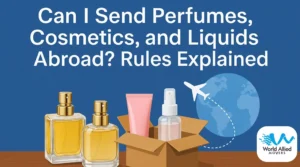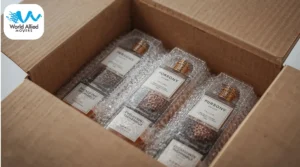Sending perfumes, cosmetics, and other liquids overseas has become common for personal and business reasons. But many people still wonder, Can I send perfumes, cosmetics, and liquids abroad? The answer is yes, but it comes with important conditions. Shipping perfumes, cosmetics, and liquids abroad is not as simple as packing a box and sending it. There are strict rules to follow, including flammability concerns, airline regulations, and customs compliance.
This article explains everything you need to know about how to ship liquids internationally safely and legally. We’ll cover what products are allowed, what restrictions apply, and the best way to prepare your package for hassle-free delivery. Whether you’re an online seller or sending a gift to someone overseas, this guide will help you avoid delays, penalties, and shipping problems.

Why Are There Restrictions on Shipping Liquids and Cosmetics?
When it comes to shipping perfumes, cosmetics, or any liquid internationally, there’s more at stake than just delivery speed. Many of these products fall under the category of dangerous goods because they can be flammable or pose health and safety risks during transit. For example, perfumes often contain alcohol, which is classified as a hazardous material. Similarly, some cosmetic products include chemicals that airlines and couriers regulate strictly.
Another reason for restrictions is international safety compliance. Airlines and shipping carriers must follow regulations from organizations such as the International Air Transport Association (IATA). These rules ensure the safe handling, packaging, and labeling of goods to avoid accidents in the supply chain.
In addition to safety, customs authorities require proper declarations and documentation for products like liquids and cosmetics. Failure to comply can result in delays, fines, or even shipment confiscation.
What Liquids and Cosmetics Can You Ship Internationally?
Not all liquids and cosmetic products are restricted. Many items can be shipped abroad as long as they meet safety guidelines and carrier requirements. For example, non-flammable liquids such as lotions, shampoos, and water-based creams are generally allowed without special handling. Similarly, cosmetic powders, eye shadows, and lipsticks are usually safe for international shipping.
However, perfumes and certain cosmetics with high alcohol content often require special documentation like a Material Safety Data Sheet (MSDS) because they are considered flammable. Some countries may also require import permits for specific items, especially alcohol-based products.
It’s important to check each carrier’s list of restricted items, confirm with customs authorities, and follow the official rules for sending cosmetics overseas. Knowing what you can ship helps avoid delays and penalties while ensuring your products arrive safely.
Common Restrictions and Prohibited Items When Shipping Perfumes, Cosmetics, and Liquids Abroad
When shipping perfumes, cosmetics, and liquids abroad, understanding restrictions is crucial. Most carriers and customs authorities classify alcohol-based perfumes and flammable products as dangerous goods, which require special handling and documentation. Items like aerosol sprays, nail polish removers, and solvent-based products often face strict limitations or complete bans.
Some countries prohibit shipping liquids entirely without proper labeling and MSDS certification. Even non-flammable items like lotions and shampoos must comply with packaging guidelines to prevent leaks during transit. Certain chemicals, corrosive agents, and products that resemble hazardous substances are outright banned in many regions.
International shipping laws also vary by destination. For instance, countries in the EU have cosmetic safety regulations, while the US enforces additional FDA guidelines. Failure to follow these rules can lead to customs delays, fines, or shipment confiscation.
Always check with your courier and confirm the prohibited item list before sending perfumes or cosmetic products overseas. Compliance ensures smooth delivery and protects your business from unnecessary risks.
Understanding Dangerous Goods Regulations for Liquids and Perfumes
When shipping perfumes, cosmetics, or other liquids internationally, it’s important to know if your products fall under the category of dangerous goods. Alcohol-based perfumes, nail polish, and aerosol sprays are often classified as hazardous because they are flammable. These products must comply with the International Air Transport Association (IATA) regulations for air freight and similar maritime safety guidelines for sea transport.
Most carriers require a Material Safety Data Sheet (MSDS) for hazardous liquids. This document outlines chemical composition, flash points, and handling instructions. Depending on the product type and destination country, you may need special labeling, packaging, and sometimes a license for transport.
Carriers often enforce strict packaging standards for dangerous goods to minimize the risk of leaks or accidents during transit. Failure to follow these requirements can lead to fines, shipment rejection, or legal issues.
Before shipping, check whether your perfume or cosmetic products require DG classification and confirm compliance with both carrier and destination country regulations. Following these guidelines ensures safe and legal international shipping.
Customs Requirements and Taxes for Shipping Liquids and Perfumes
When sending liquids, perfumes, or cosmetics internationally, customs compliance is non-negotiable. Every shipment must include accurate documentation, such as a commercial invoice, packing list, and correct HS codes for product classification. Incorrect details can lead to customs clearance delays, penalties, or seizure of goods.
For perfumes or alcohol-based products, many countries classify these as dangerous goods, requiring a Material Safety Data Sheet (MSDS) to detail chemical composition and handling guidelines. Without this, your shipment risks being rejected at customs.
Expect import duties, VAT, or GST based on the destination country. For instance, the EU, UK, and Middle Eastern countries impose taxes on cosmetic and liquid imports, often calculated on the cost, insurance, and freight (CIF) value. Some items like alcohol-based perfumes may also attract excise duties.
To avoid surprises, check the import rules of your destination country before shipping and use tools like duty calculators or consult your carrier for cost estimates. Proper compliance ensures a smooth, hassle-free delivery process.

Shipping Restrictions and Banned Items You Must Know
Before you pack perfumes, cosmetics, or liquids for international delivery, understand that not all items are allowed everywhere. Countries have strict shipping restrictions on specific products to ensure safety and compliance.
Commonly restricted or prohibited items include:
- Flammable liquids like nail polish remover, acetone-based cleaners, and alcohol-based perfumes above certain concentrations.
- Aerosols and sprays, as they pose explosion risks under air pressure.
- Hazardous chemicals, solvents, or corrosive cleaning agents.
Cosmetic items such as creams, lotions, and non-flammable shampoos are generally allowed, but they must meet local cosmetic regulations and labeling requirements. For example, the EU enforces strict safety standards under Cosmetic Regulation (EC) No 1223/2009.
Always check the destination country’s import rules before shipping. If an item falls under the dangerous goods category, carriers may require additional paperwork and packaging certifications. Ignoring these rules can lead to shipment confiscation, fines, or legal issues.
When in doubt, consult your courier service for a list of prohibited or restricted items, or visit official customs websites for updated guidelines.
Tips for Safe and Compliant Shipping of Perfumes and Liquids
Shipping perfumes, cosmetics, and other liquids internationally requires proper planning and packaging to meet safety and compliance standards. Here are essential tips:
- Use Leak-Proof Containers
Ensure bottles are tightly sealed. Leave extra space inside the container for liquid expansion during transit. - Add Secondary Protection
Place containers in a waterproof bag or vacuum-sealed pouch to prevent leaks from damaging other items. - Cushion with Absorbent Materials
Use bubble wrap, packing peanuts, and absorbent liners inside a sturdy box to minimize movement and absorb spills if they occur. - Label Properly
Include a “Fragile” or “Liquid” label on the outer package. For flammable perfumes or alcohol-based products, attach the correct hazard labels as required by dangerous goods regulations. - Prepare Documentation
Check if your shipment needs an MSDS (Material Safety Data Sheet) and provide accurate HS codes for customs clearance.
By following these steps, you reduce the risk of leaks, delays, or non-compliance, ensuring your products arrive safely and in perfect condition with the best courier for shipping perfumes abroad.
FAQs: Common Questions About Shipping Perfumes and Liquids Abroad
Q1: Can I send perfumes internationally by air?
Yes, but perfumes with alcohol are classified as flammable liquids, so they require special packaging, proper labeling, and carrier approval.
Q2: Do I need an MSDS for shipping perfumes or cosmetics?
Yes, if your items contain alcohol or hazardous components. The Material Safety Data Sheet helps carriers and customs handle your shipment safely.
Q3: Can I ship skincare products overseas?
Most skincare items like lotions and creams are allowed if they are non-flammable and meet customs regulations of the destination country.
Q4: How much liquid can I send internationally?
It depends on the airline or courier restrictions and the destination country’s rules. Typically, larger quantities require bulk packaging or freight services.
Q5: Are perfumes and cosmetics subject to extra customs duties?
Yes, import duties and taxes vary by country, and accurate HS code classification is necessary to avoid delays.
Conclusion: Ensuring Safe and Compliant Shipping
When it comes to shipping perfumes, cosmetics, and liquids abroad, compliance and preparation are the keys to success. Understanding carrier rules, using proper packaging, and providing accurate documentation like MSDS can prevent delays, fines, or rejection at customs. Always research customs regulations for liquids in your destination country to ensure smooth delivery. Partnering with experienced international courier services will help you stay compliant and provide a hassle-free experience for your customers.


